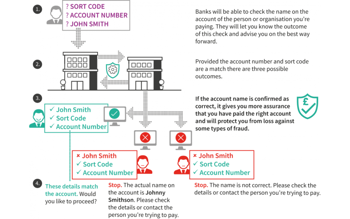
On Thursday 18th October, the leading retail payments authority Pay.UK announced the proposed change to payment authorisation of ‘Confirmation of Payee’ (CoP). The change is likely to come into force in 2019.
Simply put, this change will ensure that when a payment is instructed with a bank, the payee account holder’s name will be checked and verified along with their sort code and account number. This additional check will give further assurance that all funds are reaching the correct account, whilst also providing another layer of security to combat some of the fraudulent activity currently prevalent, such as Authorised Push Payment (APP) scams.

How might this affect Direct Debit bureaux?
For Direct Debit providers such as Access PaySuite, it’s unclear what the impact of this change could be. Direct Debit is a ‘pull payment mechanism’, whereby the end user is agreeing to or instructing that future payments can be taken. As such, payment is not taken there and then, and may not come under precisely the same regulation.
However, one of Pay.UK’s overall strategic objectives is for every payment service provider (PSP) to be robust and resilient, hence security should be one of the ultimate deliverables for any payment method. It should be expected that all future bank account verifications will require this type of verification, so all PSPs are preparing for it.
In the world of Direct Debit, it may be that bureaux will be required to have end-user account name verification on their online sign-up pages. This could potentially offer an improved customer experience, with less information being required. However it is likely that the current strict guidelines enforced by Bacs and each bank will continue, so it is unclear how much innovation could be expected.
Could a centralised infrastructure work for PSPs?
Pay.UK’s published guidance on the development of CoP highlights some of the considerations and concerns of consumers and stakeholders and how these are being addressed. One of these is the call for a centralised infrastructure whereby PSPs would need to engage with third-party vendors to support with the delivery of their CoP requirement, or develop their own solutions that support collaborative CoP decision-making using third-party providers. The former may be a concern for PSPs who wish to ensure continued high levels of customer service who would find themselves reliant on other third-party suppliers. However, some smaller PSPs may find it difficult and cost prohibitive to develop their own solution, and so some market consolidation may be seen.